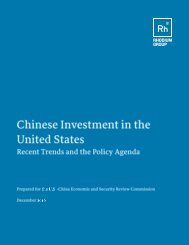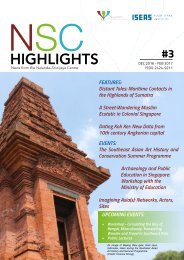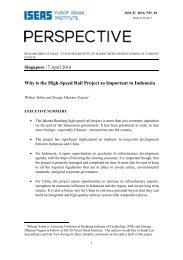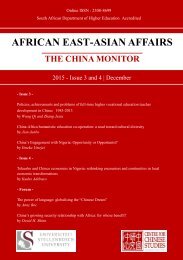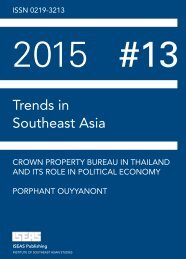Create successful ePaper yourself
Turn your PDF publications into a flip-book with our unique Google optimized e-Paper software.
<strong>as</strong>sembly, organisation, belief and strike. Censure of corrupt officials.<br />
(4) General <strong>in</strong>crement of salaries for employees and soldiers. Relief me<strong>as</strong>ures for <strong>the</strong><br />
distressed and <strong>the</strong> unemployed. Development of <strong>in</strong>dustry, commerce, agriculture<br />
and national economy. Self-determ<strong>in</strong>ation of rate of customs revenue.<br />
(5) Eight-hour work<strong>in</strong>g day. Increment of wages. Abolition of <strong>the</strong> systems of contractlabour<br />
and apprentice. A non-contributory social <strong>in</strong>surance system.<br />
(6) Abolition of all heavy and miscellaneous levies and taxes and high <strong>in</strong>terest moneylend<strong>in</strong>g<br />
system. Decrement of rents and duties. Improvement of farm irrigation<br />
work. Repeal of agricultural control. Right of freedom of till<strong>in</strong>g.<br />
(7) Equal pay for sexes and nationalities. A system of two months’ leave with full pay<br />
for female workers dur<strong>in</strong>g <strong>the</strong> period before and after <strong>the</strong>ir giv<strong>in</strong>g birth to a child.<br />
Safeguard<strong>in</strong>g of <strong>the</strong> equality between <strong>the</strong> sexes <strong>in</strong> economical, political and social<br />
stand<strong>in</strong>g. Abolition of <strong>the</strong> ‘Mooi chai’ system and <strong>the</strong> women foformatory [sic.<br />
reformatory?]. 5<br />
(8) A democratic system <strong>in</strong> <strong>the</strong> army and o<strong>the</strong>r forces. Equal treatment between officers<br />
and common soldiers. Abolition of such regulations for suppress<strong>in</strong>g <strong>the</strong> ranks and<br />
files. Preferential treatment for <strong>the</strong>ir family.<br />
(9) A system of universal education, us<strong>in</strong>g our national language for each nation. Free<br />
education for poor students. Development of national culture.<br />
(10) Solidarity with all oppressed nations and peace-lov<strong>in</strong>g countries and peoples to fight<br />
aga<strong>in</strong>st <strong>the</strong> Imperialist war, to uphold <strong>the</strong> peace policy of <strong>the</strong> SU, and to back-up <strong>the</strong><br />
War of Resistance of <strong>the</strong> Ch<strong>in</strong>ese nation and <strong>the</strong> National Liberation Movement of<br />
India. 6<br />
<strong>The</strong> Ch<strong>in</strong>ese version referred to “us<strong>in</strong>g our national language for each nation” (clause(9)) is “ 用 本<br />
民 族 语 文 实 行 普 通 教 育 ”. This meant that Malay students should be taught <strong>in</strong> Malay, Ch<strong>in</strong>ese <strong>in</strong><br />
Ch<strong>in</strong>ese (Mandar<strong>in</strong>), and Indians <strong>in</strong> Tamil.<br />
3. Manifesto of <strong>the</strong> Central Executive Committee, MCP<br />
An English document, “Forward to a National Anti-Imperialist United Front for Free Independent<br />
and Democratic Republic of Malaya”, dated 9 February 1940, is summarized below:<br />
119



